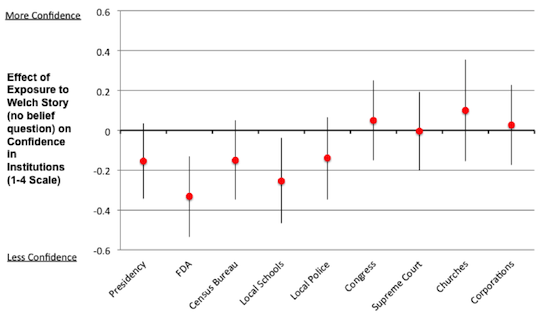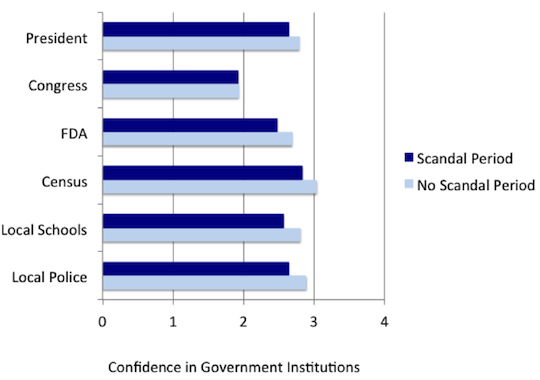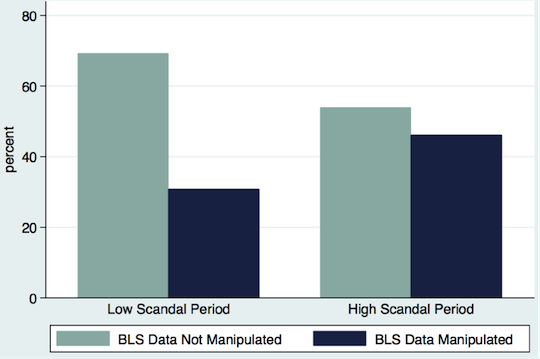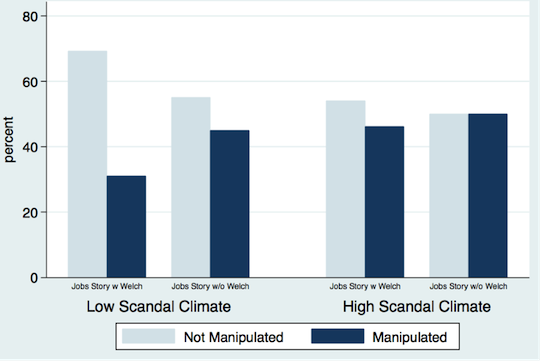We often speculate about how media coverage could make people cynical about politics and government. But new political science research suggests just how significant those effects can be, using Jack Welch’s jobs report conspiracy theory and coverage of the IRS scandal as case studies.
The research comes in a pair of papers by Boston University political scientists Katherine Einstein and David Glick. In a study conducted in January 2013, Einstein and Glick tested what happened when people read “he said,” “she said” coverage of former General Electric CEO Jack Welch’s unsupported claim that the Obama administration manipulated unemployment data from the Bureau of Labor Statistics. A relatively diverse but non-representative sample of online study participants read an article about Welch’s claim that was based on a particularly credulous ABCNews.com story. (As I wrote at the time, the ABC story led with “suspicions that the White House might be cooking the books” and then devoted five additional paragraphs to detailing the unsubstantiated charges before bothering to refute them.)
Participants who read the conspiracy theory article provided by the researchers tended to express lower levels of confidence in a range of government institutions–the presidency, federal bureaucracy, and local schools and police–than those who weren’t given the article, the study found (note: all graphs are from Einstein and Glick but the captions are my own):
had less confidence in government

We might infer from these data that at least some readers who read the credulous coverage accepted Welch’s claims and thus became less trusting of government.
Interestingly, however, a little bit of critical thinking seems to make a big difference. When the researchers asked participants directly whether they believed the jobs data was manipulated, those who had read Welch’s claim were actually less likely to say they believed in a conspiracy than those who had not read that article–perhaps because the specific conspiracy claim created a backlash. The general trust-diminishing effect created by reading the article also disappeared when respondents were asked directly about Welch’s statement. These findings suggest that participants who reflected on the conspiracy theory were more likely to reject both the specific claim and its implications.
Einstein and Glick followed up that research with a new working paper presented last Thursday at a panel that I participated in at the American Political Science Association annual meetings in Chicago. In this paper, they described a second version of their study, which was conducted with a different but demographically similar set of respondents at the height of the IRS scandal in May. As the figure below illustrates, participants exhibited less confidence in an array of government institutions when scandal fever was at its peak:

Participants were also significantly more likely to believe Welch’s claim if they read about it in May, when the IRS scandal was dominating the headlines, than they were back in January:

There was one other important change during the period of scandal coverage. In the January study, respondents who read the credulous article and were then asked about Welch’s claim were significantly less likely to believe that the unemployment statistics had been manipulated than participants who did not read the article but were asked about the claim anyway. As the figure below illustrates, however, this backlash effect disappeared in the May study–a finding that Einstein and Glick interpret as the result of the cynicism encouraged by intense scandal coverage:
only in low-scandal period

These findings have important implications for journalists. First, credulous reporting of unsubstantiated conspiracy theory claims has potentially significant consequences. It may not only increase belief in the claims in question, but could also make readers more cynical or distrustful about government–particularly if they don’t reflect carefully on what they have read or heard.
Likewise, journalistic coverage of scandal can make the public more vulnerable to conspiracy theories. When scandal allegations are dominating the news, even unrelated claims about government misconduct may seem more plausible.
Of course, some scandals involve genuine misconduct or abuse of the public trust. We need a press corps that is skeptical and aggressive to track down those stories. But Einstein and Glick’s research shows why it’s essential that journalists stick to the facts rather than letting narratives drive their scandal reporting or giving credence to conspiracy theories. Irresponsible coverage creates the potential for a vicious cycle in which conspiracy theories about an administration help generate scandals that, in turn, reinforce yet more conspiracy theories.
Follow @USProjectCJR for more posts from this author and the rest of the United States Project team.
Brendan Nyhan is an assistant professor of government at Dartmouth College. He blogs at brendan-nyhan.com and tweets @BrendanNyhan.
